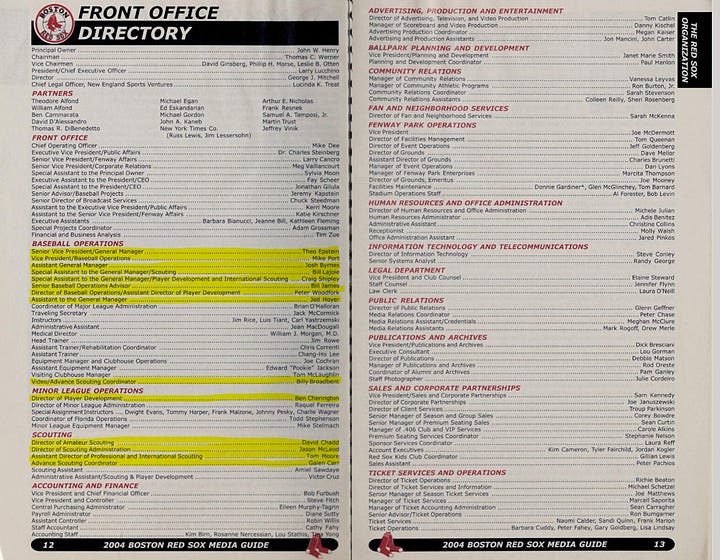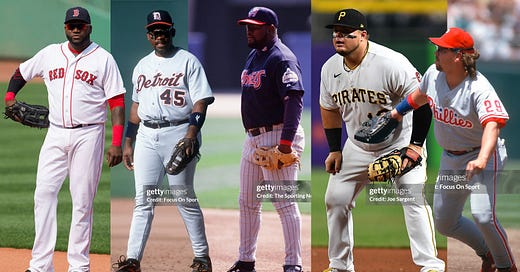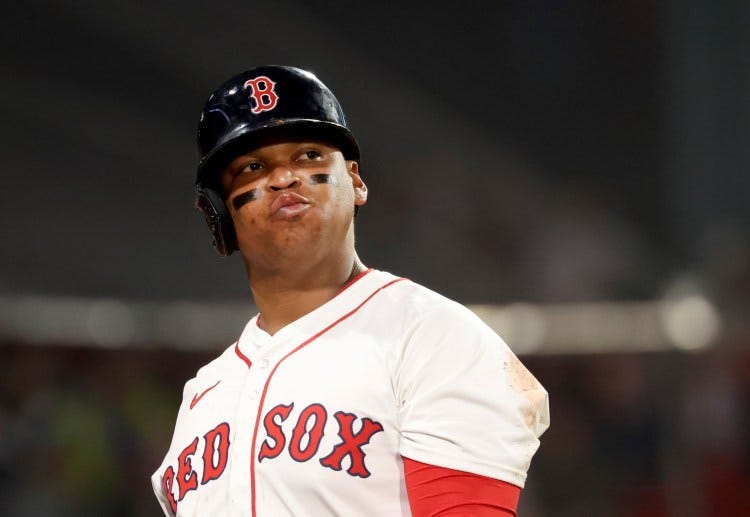Rafael Devers' Relatable Frustration with Management
He's just like us! If we made 400x more in salary, but still...
Rafael Devers’ drama-filled 2025 season has added another chapter. In spring training, he was asked to put his glove on ice and accept being the Red Sox designated hitter for 2025 when the team signed Alex Bregman, who also plays third base. They now need him to break in a first base mitt and man the “other” hot corner after Triston Casas suffered a season-ending injury. Like any smart employee, he said “no” to management’s request, while pointing out some unpleasant truths about the team’s leadership under President of Baseball Operations Craig Breslow. And like any disgruntled employee, he got called into the principal’s office when team owner John Henry flew to Kansas City to have a friendly chat with his third baseman designated hitter first baseman(?). The resulting drama has led to buckets of internet ink spilled on the topic, from articles blasting Devers’ selfishness, to calling for a trade, to questions about the team’s front office. Even David Ortiz chimed in.
“When you’re the man on the team, when you’re the guy the organization counts on, there are times when you have to take your ego and pack it away.” - David Ortiz, 5/12/25 on Mega 97.9, a New York merengue and salsa radio station.
There’s a few layers to this, but ultimately I think I side with Devers. Not because I would also refuse to accommodate the team’s request, especially given the emergency nature of the situation with Casas out long term and no replacement readily available. I would happily grab my glove and go back to being an everyday fielder to help my teammates. Just like I’ve always been happy to pick up some slack at my accounting jobs when employees leave, are sick or otherwise swamped.
But I do have a problem with the lack of communication and mixed messages coming from the decision makers in the organization, and that’s something everyone’s dealt with in the real world. It’s also not as simple as buying a first baseman’s glove and jogging out to your new position, because…
First Base is Incredibly Hard
Ron Washington was right, first base isn’t easy. I think it gets that reputation because that’s the only spot to stash unathletic or aging players with weak arms, especially left-handed players, who can’t play anywhere else on the infield. And with Rafael Devers ranking as the worst 3B on the defense over the past 5 years by Statcast’s Outs Above Average metric, posting a score of -34 runs saved. I know that’s bad. I watched probably 50 clips of him at third and I just think he’s not aggressive enough to the ball. He rarely charges or attacks the ball and ultimately lets it play him. But he’s got an arm and the legs of a 28-year-old, so he could have improved with some extra work I think.
The easiest example is David Ortiz, a 6’3”, 230-pound lefty who played 278 games at first base during his Hall of Fame career… and 2,029 as the DH. But he also had to man first 7 times in 3 different World Series matchups in NL parks. They needed his bat in the lineup even if it meant sacrificing on defense, and the easiest place to make that happen was first. He was up to the task: he never made an error in those games.
But just because the position is the softest landing spot for those kinds of players doesn’t mean it’s easy. After a lifetime spent learning one position, you can’t expect to play a new one at the big league level with little preparation, and do it competently. Compare a third baseman’s job to first base. At third, reaction time and a strong arm are the most important physical traits needed. In 2024, there were 1,252 balls hit over 100mph to third base (line drives or grounders). When you’re standing 80 to 110 feet away from the plate, that’s coming quick. First base saw 790 balls hit with the same profile, so there’s plenty of action on the right side, too. Once you field the ball, you’ve gotta get the ball across the diamond with enough velocity to record the out. Devers was more than capable of that, reaching 85mph on his hardest throw last season. You can see below where first base’s arm requirements are nearly non-existent.
That’s almost the only thing harder at third than first. I played probably 90% of my baseball life at 3B and loved it. I got to dive, react, charge balls, chase pop ups and make hard throws to first. I joined an adult wood bat league this summer and somehow got slotted in as a first baseman for the first 5 games. I had literally never played first in my life, and it was obvious. The first ground ball to the hole between first and second I chased way too far and abandoned the bag. The runner made it easily. Another batter went for a sac bunt and I charged in, again abandoning first base and costing us that easy out. All the reactions and “dog-chasing-a-tennis-ball” mentality I’d built up for 30 years was costing us outs.
I had to learn the tricks of 1B quick or end up benched. It’s a lot more than third base ever required, especially with footwork. You’ve gotta be light on your feet and have excellent body awareness to be good. When a ball is hit, the first baseman needs to sprint to the bag, square up to the fielder and present a target. Then they’ve gotta be ready stretch to get an out and react to errant throws. Picking balls out of the dirt to get an out, lunging or jumping to catch a sailing throw, and making split-second decisions on whether to try to hold a foot on the bag or make sure to catch the ball and prevent free bases when the ball gets past them into foul territory. Then there’s holding runners on, which is a lot of squatting, straddling the bag and then hopping into a ready position. When a lefty is up, especially a hard-hitting one, that leaves you focusing on landing softly and ready to pounce in any direction while someone potentially blasts 100mph at your head from 85 feet away.
Oh, and then if you want to be really good, you need to be able to turn the 3-6-3 double play, a choreographed dance that requires soft hands, a strong throw and quick movement back to the bag for what will usually be a close play at first. And you get to do all of this while the runner is barreling down the line aiming for the same 18”x18” piece of real estate you’ve got your foot touching. Collisions are rare, but still devastating.

I’m sure there’s more to it than what I just said. That’s just what I’ve learned in my two-week crash course at Will Clark’s position. So yeah, I can understand Raffy’s reluctance, especially after acquiescing earlier and moving off the diamond, probably now 2 months without regular defensive practice. It’s also a little reckless on the team’s part, risking their best hitter by putting him in a vulnerable position with no heads up. At least let him work on it in practice for a while and see if it takes, and if it needs more time than that, shelve it until the offseason. But maybe the Red Sox have every right to be a little impatient because…
He’s Making a Ton of Money
Rafael Devers is making $29,500,000 in 2025. He is signed to a 10-year/$313,500,000 deal through 2033. This is where everyone gravitates when they want to point out how selfish Rafael Devers appears. He’s making $182,098.77 per game this season. He makes more than the $760,000 Major League minimum every 4 games. Surely he can do what’s best for the team when even players making less than 3% of that would do the same thing. I would do whatever a team asked of me if they put a check for $182,000 in my hand before every first pitch. I’d even offer to play catcher barehanded.
With Devers’ 2025 salary, you could pay 421 teachers in Massachusetts $70,000 for the upcoming school year. He’s certainly not helping his case with some of the quotes that have come out of Boston this year.
“Third base is my position,” said Devers. “It’s what I’ve played. I don’t know what their plans are. I know we had a conversation. I made it clear, kind of what my desires were and whatever happens from here, I don’t know.” - Rafael Devers in spring training
"I know I'm a ballplayer, but at the same time, they can't expect me to play every single position out there. In spring training, they talked to me and basically told me to put away my glove. I wasn't going to play another position other than DH. Right now, I don't think it would be an appropriate decision by them to ask me to play another position." - Rafael Devers on May 8
A little bit tone deaf to put those words into the public sphere when you earn most Red Sox fans’ yearly salary by the 7th inning stretch. But his situation is actually more relatable than you’d think because…
He’s another victim of corporate America’s disdain for employees
Major League Baseball has metastasized from a collection of sports teams into a conglomerate of 30 corporations who happen to play baseball as a part of their product portfolio. Revenues continue to grow as ownership groups and front offices claw at every dollar available. Brutal cost cutting measures, gawdy ad placements and media rights deals that put baseball games on streaming services that may only exist in 55 homes are the norm right now. This kind of short-sighted decision making, combined with a complete lack of people skills, leads to situations like Devers is in now, and that many employees have experienced in their own lives.
Part of it is the increasingly bloated roster of executives and coaches in Major League organizations. Here’s the general manager’s office and coaching staff of the 2004 Boston Red Sox, a group that managed to end the 86-year Curse of the Bambino. I count about 14 people involved in baseball operations with GM Theo Epstein, and seven on the coaching staff with manager Terry Francona.


Now look at the 2024 version:


In 20 years, the team has added layers upon layers of VPs, executive VPs, directors, coordinators, specialists, assistant directors, senior developers, senior VPs… the kinds of job titles that impress LinkedIn recruiters but are just the corporate version of catfishing. You’re not a senior Vice President of Media Relations, you’re a PR rep… There’s a whole new section for the analytics department, dozens of GM assistants who occupy a middle ground of half front office, half coach, and scouting positions all over America, Latin America and the rest of the world. The coaching staff is at about 11 members now, including assistant hitting coaches and pitching coaches. It’s a lot of cooks in the kitchen now.
Now pretend you’re Rafael Devers, who signed with the Red Sox on August 9th, 2013 at 16 years old as a third baseman from the Dominican Republic. He was signed because of his potential and raw talent. He is 28 years old now. Nearly half of his life has been spent as a member of the organization, including his teen years when you’re nowhere near mentally ready for the grind of baseball stardom.
By now, 12 years in to his time with the Red Sox, he’s probably had over 200 different voices telling him how to play baseball in some shape or form, whether it’s direct coaching advice from one of dozens of coaches in Boston, Salem, Portland, Pawtucket, the Dominican academy, or analysis from the development team telling him to make minor adjustments that their Python script says will add three points to his batting average, or the parade of special assistants and former players who come through every spring training with their “back in my day” approach and tips.
Rosters, staffs and front offices turn over regularly in baseball. Turnover in white collar jobs is high these days, also. Tech companies run as high as 18%. As a senior-level accountant for the past ten years at a few different companies, my little flowchart rectangle was constantly relocated around the company organizational chart as managers and executives came and went, or investors took over, or layoffs hit. My job remained pretty much the same every time, and so did my salary. I did what the job description of my position required of me. I completed my work at a satisfactory level. What’s the accounting version of Wins Above Replacement? Spreadsheets Completed Above Temp-level? SCAT?
My managers changed yearly, sometimes more often than that. My role never changed. I’d report to a manager, or a different department, or get shifted back to another supervisor. For one 6-week stretch I reported directly to the CFO, someone who had no idea I existed or what I did. My journal entries went unapproved for that time period and caused some minor chaos when that shit hit the fan. I got to thinking… this whole time I’m doing my job, and doing it well. Yet management and the C-suite can never get their shit together and come up with a coherent strategy. One month, there’s promise of growth and expansion and new additions to the department. The next month, someone’s fired and never gets replaced as they expect us to pick up their workload.
It gets to the point where there’s no one you’d be willing to listen to or fight for. I’d work hard for my co-workers, because if I slacked off they’d have to pick it up. But I felt no loyalty or desire to go above and beyond for an ever-changing group of overpaid, over-educated, overrated executives with less people skills than a Twitter troll. Why should I do more for than the bare minimum for you when you have never done more than the bare minimum for me? It might be an immature way to look at it, but if I’m hired for one purpose, I’m going to need a little incentive to exceed that.
When he signed his deal on January 11, 2023 the front office was led by Chaim Bloom, who departed after that season. It was all sunshine and rainbows at the time:
“He’s not just a star. He’s our star. It’s a wonderful thing to retain a homegrown player, who loves Boston and who Boston and Red Sox nation loves back.” - Chaim Bloom after the signing
“It’s a great day for us, a great day for the organization … But it’s a great day for Raffy. He’s been in every camp, he’s been in every instructional league. He took every step throughout the organization and now he’s the main guy here.” - manager Alex Cora
Two years later, new POBO Craig Breslow signs free agent Alex Bregman to a large dollar, short-term deal and surprises Devers with news he’s no longer wanted on the infield. Never mind that Devers has been a Red Sox lifer to this point and was coming off a three-year stretch where he’d averaged about 30 homers a season for a team that basically a cellar dweller in the AL East. Alex Bregman is three years older, a lesser hitter and a better fielder, so on paper having him at third this season makes sense. But teams aren’t just run on spreadsheets. Someone needed to have a conversation with Devers and present the case for moving him to DH.
This is where I side with him. Management makes these rash decisions without asking those affected what their thoughts are. Ultimately, he probably should have been the DH, but you’ve gotta show some people skills if you want to be a successful manager of employees, whether they make $50k a year or $30mil. And the fact that the owner came in to lower the temperature shows that they probably know that Breslow and the front office fumbled this situation badly. I’d put some blame on Alex Cora, too, but these decisions are made above his level and he’s just a middle manager for a corporation with 26 people reporting to him, basically. Shit rolls downhill always.
The lesson here for everyone is work on communication. If you want me to adapt and shift roles or responsibilities that weren’t on my original offer letter, you have to get me on board. It doesn’t matter that Rafael Devers is a superstar baseball player, the job description he signed essentially says: hit like an All-star and play third base. Now they’ve changed the terms and he doesn’t know what’s expected for half the game every night.
So close your laptop, head down the hall, and have a conversation with your employee like an adult. Even if he is a stubborn, disgruntled employee, it’s your job to smooth that over.
Still, I’d like a $313,500,000 contract to play first base. Even though first is incredibly hard.









Oh you know I have opinions on this as a Red Sox fan. While I do think he will eventually play some 1st base, I'm firmly on Devers side in this. Communication is poor. Plus, he's been told one thing, then turned around and told something different. I would be annoyed as well! It happens in most people's jobs, I think the money just makes people have much more visceral reactions.
I think the John Henry meeting probably helped, but it sounds like it's more of an issue between Devers and Breslow. I hope Alex Cora can bridge that divide. But who knows.
It is baseball. He ultimately settled into the DH role, and I think the same thing could happen with 1st. I don't know if I'd want him to be a permanent 1st basemen, heck, David Ortiz only did it periodically during the days of NL pitchers batting.
Phew.